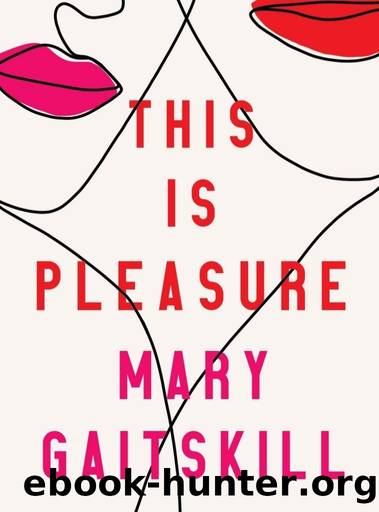This Is Pleasure: A Story by Mary Gaitskill

Author:Mary Gaitskill [Gaitskill, Mary]
Language: eng
Format: azw3
Tags: Contemporary, Feminism, Fiction
ISBN: 9781524749132
Publisher: Pantheon
Published: 2019-11-05T00:00:00+00:00
M.
There are so many funny/awful stories that itâs hard to stop telling them. The nineteen-year-old who texted him every time she (a) took a shit or (b) had sex with her boyfriend. The girl who texted him to describe her fantasies every time she masturbated (âOK, itâs hard to type right now, because my hands are shakingâ¦â). The time we attended a reading by a young female writer and Quin, on being introduced to her, stuck his hand in her face and said, âBite my thumb.â The self-possessed young woman looked at him with disgust and turned her back. I said, âWhy did you do that?â He wasnât fazed. âSheâs cute,â he said. âBut sheâs not game.â He shrugged.
Grotesque, but at the same time paired with such peculiar, delectating joy. Once, when my husband and I were feeling down, we talked about how everyone we knew seemed ultimately unhappy, or at least discontented. âExcept Quin,â I said. âExcept him,â Todd agreed. And, putting on his Quin-the-pervert face, he quoted, âWhere the bee sucks, there suck I!â We laughed, then sat there, contemplating Quinâs abnormal happiness.
And why wouldnât he be happy? He had a gorgeous wife and an exceptional child, and he was an excellent editor, who published some of the best writers of the moment. They tended to be clever niche writers rather than heavyweights, but the quality was undeniable and some of them had devoted followings. Many of them were writers whom no one else in publishing had believed in at first. Quin did believe, passionately, even morally: âSheâs marching for goodness,â he might say, or âHeâs marching for sexualityâ or âmarching for truthfulness.â (Morality was, oddly, important to Quin. He analyzed and criticized people based on their moral traits; âself-centeredâ was one of his harshest accusationsâan irony, given how much he encouraged people to talk about themselves.) Quin would take up these marchers, pay them advances that were all out of proportion, and exult when they succeeded. Which happened often enough that even writers whom everyone believed inâthat is to say, bid onâfinally came to him too, without his making much of an effort to land them.
I remember going with him to a publishing party for one of them, a young black man (âMarching for justice with humor and style!â) whom Quin had positioned for celebrity. The party was held in an art gallery that was showing work by someone who painted imitations of hoary masterpieces, in which she had replaced the original Caucasian figures with famous people of color. I met Quin in his office; I was wearing a skirt and heels and carrying a shopping bag and a little purse. He insisted that I let him carry the shopping bag, because, even though I would check it at the door, he thought it spoiled my lookâplus he would enjoy being âat [my] service.â I agreed, and then he said that he thought I should also dispense with the purse, because, although it was small and very nice, it made me look less free.
Download
This site does not store any files on its server. We only index and link to content provided by other sites. Please contact the content providers to delete copyright contents if any and email us, we'll remove relevant links or contents immediately.
The Fine Print (Dreamland Billionaires Book 1) by Lauren Asher(2562)
Fury of Magnus by Graham McNeill(2454)
The Last House on Needless Street by Catriona Ward(2409)
The Rose Code by Kate Quinn(2221)
A Little Life: A Novel by Hanya Yanagihara(2154)
The God of the Woods by Liz Moore(1948)
Malibu Rising by Taylor Jenkins Reid(1932)
Luster by Raven Leilani(1904)
Transcendent Kingdom by Yaa Gyasi(1863)
Moonflower Murders by Anthony Horowitz(1855)
The Lost Book of the White (The Eldest Curses) by Cassandra Clare & Wesley Chu(1706)
This Changes Everything by Unknown(1510)
The Midwife Murders by James Patterson & Richard Dilallo(1495)
The New Wilderness by Diane Cook(1446)
The Lying Life of Adults by Elena Ferrante(1435)
Wandering in Strange Lands by Morgan Jerkins(1430)
Written in the Stars by Alexandria Bellefleur(1409)
Ambition and Desire: The Dangerous Life of Josephine Bonaparte by Kate Williams(1395)
The Lying Life of Adults by Elena Ferrante;(1314)
